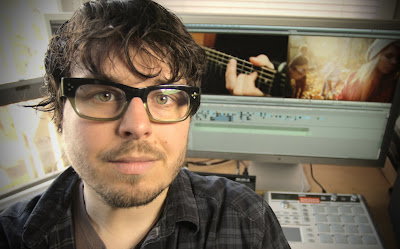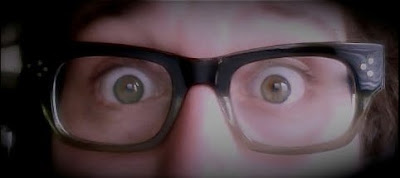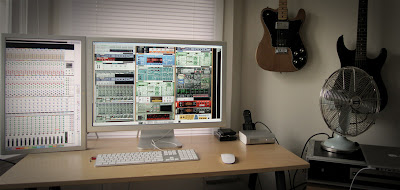
Usually when I ask someone if they're interested in doing an interview I know quite a bit about the person. With Ryan Harlin, I only knew of his top rate video production work for Propellerhead. Serendipitously I found out while researching for the interview that he was part of an electronica duo that I'd discovered years ago on Sirius satellite radio. With this edition of 10 Questions we'll talk about Ryan's work with Propellerhead, his own musical creations and years spent running a recording studio in Philadelphia. Without further ado.......
- First off, where were you born and what was your first instrument?
I grew up in Philadelphia, Pennsylvania. My first instrument? That depends on how I count. My instinct would be to say "guitar" but I played cello in 3rd grade. The only reason I picked cello in school was because I wanted to play guitar. I never practiced cello with a bow in the traditional way. I turned it sideways on my lap and strummed it to make the closest approximation I could to a guitar. At age 9 my brother got a guitar for Christmas and I got a crash cymbal. My parents decided Jesse would learn guitar and I would learn drums. Their plan was to buy me one piece of the kit at a time. Even at age nine I understood the fallacy of their plan: what the heck is a kid going to do with a crash cymbal and nothing else? So I stood in my room (since they hadn't gotten the drum throne yet) hitting a very nice zildjian crash cymbal until my brother lost interest in his guitar and I quickly took over.
- Tell me about your background in music and video production, I know you studied at the Liverpool Institute for Performing Arts, was your time there spent on music or video production?
My background is in music production, performance, and engineering. From the time I got my first Tascam portastudio I was hooked on recording. I was very fortunate because despite their misguided plan to buy me a drum set starting with the most obscure pieces first, my parents were incredibly supportive of my interest in both music and technology. Shortly after my adventures with the portastudio my dad and I went to our local music store and bought all we needed to set up a pretty sweet home studio for that era. It was a Tascam DA-88 digital recorder, a Mackie 24-8 bus mixer, some Alesis outboard gear, and a couple mics. I still think the best thing I ever did in my education process was I didn't turn anything on or plug a single thing in for two weeks after getting home.
I probably was driving my parents a little nuts because their big investment was still sitting in boxes in the home office but I didn't want to start using anything until I understood it through and through. I sat, read, and reread those manuals until I could recite large sections by memory. You have to understand this was before the internet. These manuals were the most amazing resource I had yet seen about recording, signal flow, compression techniques, etc.
My interest in recording only grew from there and after high school I started looking for a college that had a full degree program. That search sent me to Liverpool, England where I attended and graduated from the Liverpool Institute for Performing Arts in 1999. At the time, video production wasn't a big part of the course but it was something I took to. I often found myself seeking out video projects to work on - though still doing audio post for them and not production. In my final year we had a class on documentary production and my friends and I cooked up a scheme to travel to Russia to document the latest economic collapse it was suffering at the time. That was my first role in the production side of video. It was a natural lateral move for me because the tasks are so similar to audio production in my view and it even brought in a bunch of the visual design skills I had been developing in programs like Photoshop.
- Before you studied in Liverpool you were running a recording studio in Philadelphia. Tell us about your work there and are you still involved in music production professionally?
Yeah, my studio! This was back in the days when you could run a small project studio and bands who didn't have access to home recording would book it. I ran it for a few years, doing various bands ranging from singer/songwriters, punk, to jazz. It was a great learning experience but I realized how much more I enjoyed working on projects that were personally satisfying to me. I mean if I perfectly captured a jazz band's sound as they saw it I really had only successfully fulfilled their vision, not mine. I much preferred when I was working on something that was a creative outlet for me. So after graduating, I closed up shop and moved out to California where I pursued any project that allowed me to be personally creative. Some of that is in the music I make and some of that is in the visual work I do.
- I love the videos you do for Propellerheads! What software and hardware do you use to create them?
Thanks! I've been really happy to hear from people who are enjoying what I do. I've been with Propellerhead for almost a year now and the second half of the year has been fun because when I go to interview an artist now, they've seen some of my previous interviews so they kinda know what to expect and they seem to be excited to work with me. One artist I was with called up their friend and said "Hey guess who I'm hanging out with now? The guy who did that Adrock video I showed you." So that's kinda fun.
As for hardware/software, there's nothing too revolutionary about what I use. I edit in Final Cut Pro, do special motion graphics in After Effects, and I shoot interviews with a Canon 7D and a small army of Nikon prime lenses. I actually do my audio post-production mixing in Record 1.5. Sure I have to rewire it to Logic to get video sync but I've found Record to be my favorite audio post environment I've ever used. The way I can route complex splitters for multi-channel sidechain compression to do audio ducking, draw in my automation, and generally work in the fast pace I need has been a very nice surprise for me.
Far beyond software and hardware, though, I have spent many years working on two far more important ingredients of the production process: constructing a narrative in the edit room and putting people at ease in the interview chair. Those are two things that you can't solve through software. Coming from a musical background, there's a similar practice that they require like learning an instrument. You suck at first but you get better and better, hopefully. I'm always learning. In the same way that a great guitarist can sound amazing on a cheap guitar and a bad guitarist doesn't get better by playing a vintage Fender, these narrative and interactive skills have far more of an impact on what I do than the software or hardware I use.

- How are the Props promotional and tutorial videos generally scripted?
I'll split these up into their two styles since the promotional videos and tutorial videos are dealt with differently.
The promotional artist interviews aren't scripted and they're never paid for. In fact, the biggest bummer for me is when people say things on forums like "he was paid to say that" or "I was almost believing he was sincere until I came to my senses." I am extremely grateful to these artists that allow me to come into their homes or studios and volunteer half their day for my interview. Without exception, they do it because they love our software and just want to share their love of it with the community. I suppose it's the tendency for people to be jaded and think that marketing videos must be manipulated and paid for but we think that would defeat the purpose and it would be completely transparent if these guys were just reciting our talking points. In the past year I have found that these artists are as much or more excited to meet one of the Propellerhead guys in person than I am to meet them. The enthusiasm or appreciation they express in their interviews is genuine and all their own.
Aside from those, we do script the things that you hear Frank Sanderson saying - which are micro tutorials and feature announcement videos along the lines of what we did in May to announce Reason 5. Actually, I've met a few people now that are taken aback when they meet me because I don't sound like Frank. They say "but I thought you do the micro tutorials." They're right. I do but Frank reads what I've written. Believe me, I was not born for a life of voice over work. If you want to hear my speaking voice just listen to the off-camera guy in some of the deleted scenes videos we've done with Adrock, Printz Board, or Hank Shocklee and then you'll understand why Frank beat me out for the job. ; )
To answer your question about the "how" of the scripting process, it's pretty natural. We'll have an idea we want to get out there - usually a micro tutorial - and we'll draw up some bullet points of what ideas we need to include. From there I usually take about a half day to work up a script and I send it off to Frank. He's super fast so I usually have his voice over file back in a couple hours and I can start animating over the top of it. Frank's been fun to work with because we're learning to predict each other's style. I'm getting better at writing lines I know Frank can deliver well and Frank's learning how to interpret the words on the page in exactly the way I imagined him saying it when I wrote them. This is especially true for the little joke gags that appear in our micro tutorials.
- How did you hook up with Propellerheads and is it a full-time gig?
I've known those guys forever. My partner Lisa in Techno Squirrels (see next question) is friends with Tage Widsell who is Propellerhead's Creative Director of Marketing and has been with Propellerhead since 1997. I would often see them at the NAMM show in LA and they got to know me, they knew I was doing documentary films, and that I specialized in bands and music stories. A few years back Tage called me up to see if I would like to do some filming at the NAMM show for them, which I did. Then a year later he asked me to do their Jason McGerr ReFill video. From there the relationship just continued and in November of 2009 I did their Soul School release video. That was a big hit around the office and it was a big hit on music sites too. Propellerhead had been looking for someone to come aboard full-time with them and I think our plans just kinda lined up at the right time. When they asked me to join the company, I was only too happy to say yes. I've been a ReBirth user since 1996 and a Reason user since version 1.0 so I'm as much a fan of the company as anybody.

- A few years ago I was working as a bellman for a ski lodge. Our vans there had Sirius Satellite radios and I was surprised to find out when researching for this interview that you are part of the electronica duo the Techno Squirrels, who I "favorited" years ago when driving guests to the airport. Are you still making music with the Techno Squirrels?
Wow thanks! Yeah we got some heavy rotation on Sirius' electronic channels when our single "Love Comes First" came out. We are still making music. We took a bit of a hiatus after that album came out but we've written a new album's worth of material and we're in production mode now on it. Actually, you can hear what would be considered a Techno Squirrels new track on the Blocks micro tutorial video! I worked up that idea just to display the blocks concept and I asked Lisa to help out when I needed a vocal recorded for it. She liked the idea enough that I think we're going to develop that into a full song.
- The Techno Squirrels were played by one of my all-time favorite DJs - Nic Harcourt. How does a group get an internationally famous radio host to spin their music?
All credit is due to Lisa Eriksson who is one half of Techno Squirrels and runs the label we release our music on. She's a promotional animal. She used to do promotional work for Virgin Records and learned the ropes through that but she's also just got an unflagging tenacity. I really have her to thank for all our success. Nic Harcourt, the chart position on Sirius, Paul Van Dyk including us on one of his albums, and so much more. She is really good at finding the right channels to pursue, pursuing them, and then getting results.

- What equipment makes up your home studio?
In no particular order:
Music production software is 100% Reason/Record, though I keep Logic installed for when I need to sync to video. Video production software is Final Cut Pro, Motion, After Effects, and Photoshop. I record vocals with my Neumann M149 microphone, a DW Fearn tube preamp, and through my Fireface 800 interface. I have old Alesis Monitor One speakers from my studio days which are beat up but I know exactly how they sound. I play on a MPK49 keyboard controller and a Korg Padkontrol. I work on a Mac Pro 2.93 Ghz Quad Core Xeon with a 30" cinema display and a 23" cinema display set up vertically (which I highly recommend for people who want to see the Record mixer channel strips in all their glory without scrolling).
- Finally, who are some of your influences, both in music and video production?
Music: Postal Service and Death Cab For Cutie (really Ben Gibbard is the influence I guess). I listened to a whole lot of Rush as a kid but my guitar playing draws more influences from Pink Floyd and Journey for some reason. I love Imogen Heap and her previous band Frou Frou, Bjork was a big sonic influence to me. Massive Attack changed my opinion of electronic music at the height of my smug and shameful prog-rock days. I'm a total sucker for singer/songwriters like Patty Griffin, Richie Havens, or even Arlo Guthrie.
Video: Errol Morris has been a big documentary influence on me mostly for his ability to interview and capture candid natural conversations. Exhibit A: The Fog of War, but many others also. I like Michael Moore's earlier work however I don't draw influences from it. I'm not exactly storming the lobbies of corporate America like he would demanding to interview record label CEOs. I think The King of Kong is one of the best put together documentary narratives I've ever seen. It's a masterful construction of a real-life story unfolding in real time. Early on in my career I used to watch the documentary "Dogtown and Z-boys" over and over. That had a pretty big influence on me stylistically and narratively. In a similar vein, Scratch is a great documentary.
Thanks Ryan for a fantastic interview!
Stay tuned to Resonant Filter for another edition of 10 Questions...

2 comments:
That was a really well done interview, nice work.
Good to hear his description of the marketing videos from a behind the scenes perspective, too.
Btc said it all. Way cool!
Post a Comment